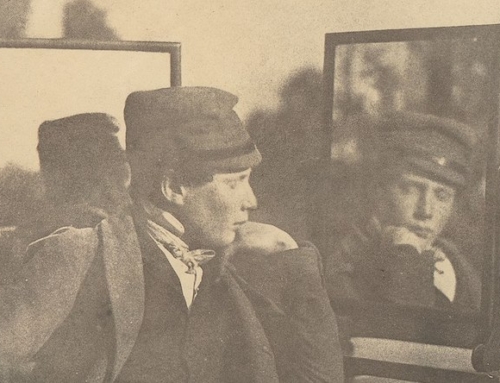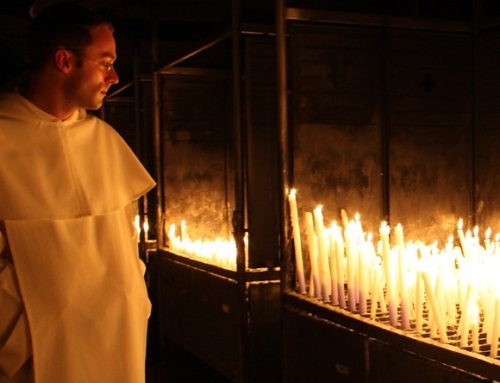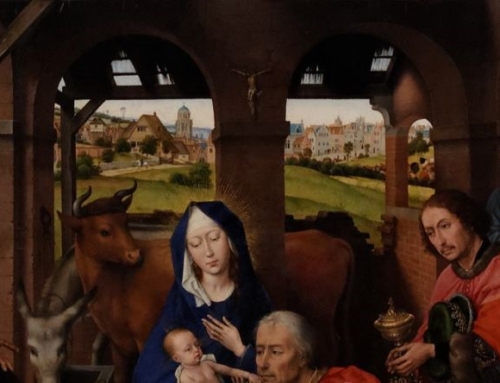Uselessness looms. It threatens each of us every day, whether by injury or illness, the decline of age or joblessness. We are overshadowed by the possibility of being rendered non-productive, non-contributing, a useless burden. The Lord answers this fear, and he comforts us with his words, “Be not afraid.” But he answers our fear of uselessness in a surprising way.
Recall the story of Martha and Mary (Lk 10:38-42). Remember that Martha is the useful one. She works hard, she keeps the house running and guests well fed; she does what needs to be done. And Jesus rebukes her for her useful busyness. “Do you see your sister Mary, how she has chosen to simply sit with me? Do you see how she has chosen to be useless with me? That is the better part.”
To be useless with God is the better part. It is not a consolation prize for those who can’t contribute, but is truly something higher.
To be useless with God means, first of all, to simply spend time with him. To waste time with him, listening and letting him speak, like Mary. This is the better part because it is our ultimate fulfillment in heaven, where we will simply be with him, and be with the whole Church and all the saints and angels. And there will be no useful work to do, because we will all be given this better part.
But here, in this world, there is work to be done. By telling us that work is not the better part, Christ doesn’t entirely dissuade us from work. He does, however, redirect our work and give it a new goal. We work, like Martha, so that we are able to sit with the Lord without work, like Mary. The Marthas of the world serve the Marys of the world, because the lower part serves the higher. And so when Jesus answers our fear of uselessness, he gives us a surprising answer. “Do not be afraid of uselessness,” he says to us, “for uselessness is better than usefulness, and I have destined all of you to be useless with me in heaven. And that will be your greatest joy.”
This is a true answer, and in it we see our destiny in heaven. But here, on earth, it is a hard answer. It is hard to accept our uselessness, or to live aware of the looming possibility of uselessness. Even if we know that work and productivity are not the highest part, it still hurts to be stripped of our ability to contribute, and instead forced to be dependent on others.
We turn to Scripture again, and find that Saint Paul in his letter to the Colossians gives us the next answer to our fear of uselessness and the hurt that uselessness inflicts. He unites all of our hurts and sufferings to the Cross: Now I rejoice in my sufferings for your sake, and in my flesh I am filling up what is lacking in the afflictions of Christ on behalf of his body, which is the church (1:24). Paul’s sufferings, by virtue of his baptism, are made part of Christ’s suffering; likewise, our own sufferings, by baptism, are joined to the Sacrifice of the Cross. On the Cross, Jesus was seemingly most useless. In his public ministry he was a teacher and a preacher. He healed the sick, he raised the dead. He cleansed lepers, he drove out demons. He did many good things. And on the cross, he could do none of those. He was seemingly useless.
Yet we know that the Cross was the most important moment of Jesus’ life. It was the reason he came down from heaven and took up our human nature. All of the deeds of his ministry—the teaching, the healings, the exorcisms—were redemptive precisely as they participated in and pointed towards the sacrifice of the Cross. Although the crucified one could do nothing, his crucifixion was his greatest work.
And Paul unites himself to that useless and most important moment. I fill up what is lacking in the sufferings of Christ. He doesn’t mean that Christ’s Cross was insufficient. Rather, he means that the suffering of Christ continues in all of his disciples. It continued in Paul, and it continues today in you and me. And so, like Paul, we rejoice in our suffering.
We rejoice because in suffering, in the uselessness of suffering, we share in the uselessness of the Cross. We are close to our Savior. Ultimately, the Cross is a uselessness that brings us to heaven where we will experience the joy of being useless with God face-to-face, which is the better part and our eternal joy.
✠
Image by Pexels from Pixabay







